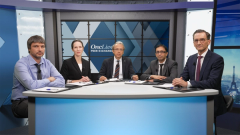
Selecting the Appropriate First-Line Therapy for Advanced HCC
In the context of the first patient profile, expert panelists consider which factors play into their selection of first-line systemic agents in advanced hepatocellular carcinoma.
Episodes in this series

Transcript:
Josep Llovet, MD: Arndt, I’d like for you to give your opinion on how you’d manage this patient.
Arndt Vogel, MD: It’s a very interesting case. I have 1 question. You said that the etiology is NASH [nonalcoholic steatohepatitis]. But the body weight was 59 kg, so he was probably not 120 kg and obese.
Andrea Casadei-Gardini, MD: No, the weight of the patient decreased in the last year before the diagnosis of HCC [hepatocellular carcinoma], by about 50 kg.
Arndt Vogel, MD: Do you think it’s related to the tumor? Or was it unrelated to the tumor?
Andrea Casadei-Gardini, MD: For the diet of the patient, I don’t think it was the tumor, because the tumor is more progressive…
Arndt Vogel, MD: That’s an interesting point. You’re talking about etiology, NASH, and how we diagnosis it. As a hepatologist, I would it’s a diagnosis by histology. This is important to consider. But if he has lost a lot of body weight, it makes a lot of sense. If you start with 10 mg, then it’s in line with the recommendations. It’s an interesting case. You would have started systemic therapy in this case because he didn’t respond. The question is, what would the choice of treatment be, lenvatinib or atezolizumab-bevacizumab? At that point, in 2021, we probably would have started with atezolizumab and bevacizumab. Maybe we can discuss later the question of whether etiology would be a reason to choose a different treatment, keeping in mind the good data we’ve recently seen for lenvatinib in patients with NASH?
Andrea Casadei-Gardini, MD: Yes, we tried lenvatinib for 2 points. The first point is the patient has uncontrolled Basedow [disease] at a baseline for this reason, but this was not it completely. The other point is NASH related to etiology because we have some data of different efficacies of immunotherapy or TKI [tyrosine kinase inhibitor] based on the etiology, so we decided to start with lenvatinib.
Joseph Llovet, MD: Graves’ disease is probably considered a formal contraindication.
Andrea Casadei-Gardini, MD: No, it’s contraindicated. [CROSSTALK]
Amit Singal, MD: Given the contraindication to immunotherapy, we’re in the landscape where sorafenib or lenvatinib is first-line therapy. At our center, given the high response rates we see for lenvatinib and the exciting data in terms of tolerance, etc, we would also have chosen lenvatinib. The comments I have relate more to post-lenvatinib management. Even though the initial lesion didn’t respond to TACE [transarterial chemoembolization], it seems as if he’s left with a relatively small tumor burden in the liver. At our center, we’d consider TACE because this lesion doesn’t look as if it’s been treated with TACE. The other thing is that we would have listed him for transplant because this patient started with limited intrahepatic tumor burden and had a very robust response. He was within UNOS [United Network for Organ Sharing] for downstaging if recall correctly. We would have listed this patient for liver transplantation at that time. It highlights that with these patients—the XXL trial is 1 that highlights this— when you take people who have a good response, there’s this initial impression: “Do I need to do transplant?” That’s because they’re responding. We have randomized data showing that those patients who have a good response do better if they go on to transplantation rather than continue the therapy that they have a response on.
Arndt Vogel, MD: But he’s 77 [years old] and has cardiomyopathy.
Amit Singal, MD: That’s 1 thing to keep in mind for another patient who has this robust response. Not for this specific [patient].
Josep Llovet, MD: To clarify, you’ll choose lenvatinib as a frontline [therapy]. In other circumstances—younger age, no cardiomyopathy, probably no Graves’ disease—you’ll consider downstaging a transplant.
Transcript edited for clarity.





































